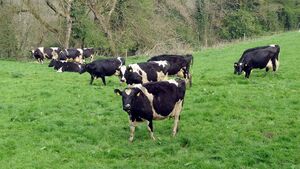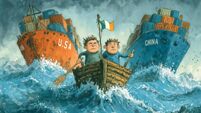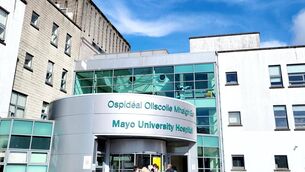Opposing Mercosur is not in Ireland's interests

Food production and exports are an important part of the Irish economic model but they are not remotely near being dominant.
Listening to our public debate about the Mercosur trade deal - the EU’s proposed trade deal with Brazil, Argentina, Paraguay and Uruguay – is confusing. The thrust of it seems to be that if the deal is approved, the price of beef might go down. That, apparently, would be a bad thing.
Have you been in the butchers lately? That would be a bad thing?
The Mercosur deal covers a vast area of trade between the EU and those four South American countries and is a hot topic right now. The EU Commission first negotiated the deal, and now has the job of trying to persuade EU member state governments to ratify it.
Such trade deals by the EU can be approved by qualified majority, meaning that no one has a veto. But a blocking minority can stop it, so every country’s voice counts.
Our government is formally opposed to its ratification. That’s because they told the farmers before the election that we would oppose it.
This is an awkward look for the government. At the same time as opposing this trade deal, it is out on every other occasion defending the importance of open trade around the world. That open trade is under ferocious attack, and since it is how we went from a poor to a prosperous country, it makes sense for us to stand up for open trade.
Except on Mercosur. How did we end up in this uncomfortable position?
The media is full of analysis and explanations. There is talk of sustainability and potential safeguards and lack of inspections and the end of the family farm and all sorts. The detail of that can be confusing, and with food inflation, those criticising the deal understandably want to focus more on issues other than that more competition can lower prices. Whatever the focus, it amounts to a lot of noise situated in the here and now.
But to understand why we find ourselves here, we have to step back in time.
In the past, it used to be in Ireland’s interests for the price of food to be expensive. This was back in the time when we were an agriculturally focused – and predominately poor – society. We made money then – or at least, the big farmers did – from exporting food. That was more or less our economic model. For that reason, politicians in Ireland, from the 19th century on, have supported policies which were designed to keep the price of food high. That made a lot of sense in the Ireland of those times.
Nowadays, we are a wealthy society, with a services and manufacturing focused economy. We make our money from trade, and the most of that is made in exporting manufactured goods and services. Food production and exports are a part of that, and remain relatively important, but they are not remotely near being dominant. The country has changed. We are no longer a predominately agricultural society. The economic model of Ireland is now trade in those complex goods and services that are made in factories all over Ireland, with a good shot of them – though not enough – in the West. And that new economic model is a good thing, because you make more money as a country that way.
The people who work in the industries who produce those things – and everyone else indeed – wants to buy food at the best possible price, not at the most expensive price. Right now food is wildly expensive and the price of it is hurting ordinary people every day. So it is now in our interests for food to be less expensive – and you make it less expensive by introducing competition through open trade. Our economy and our society and therefore the needs of our people have changed since the times when we exported only people and cattle.
And our political system has not yet got that memo.
This all happened in Britain ages ago, in the middle of the 19th century. The political system in Britain at that time essentially collapsed in response to it. That was triggered by what was called the repeal of the corn laws, which was essentially about reducing tariffs on food into the then United Kingdom of Britain and Ireland, so as to reduce the price of food for working people.
This was needed because by then Britain had moved over from an agricultural to an industrial society. Keeping the price of goods artificially high by restricting competition was no longer in its interests. That policy did not suit an agriculturally focused Ireland, but we had to put up with it.
Because we came late to this change, and only experienced economic prosperity over recent decades, the political reality of what such an economic and social change means has not yet sunk in. And this is why we end up in the strange situation where a country made wealthy by trade finds itself opposing a trade deal which would open markets to the very businesses that generate our wealth. And might also reduce the price of a steak while it is at it.
And before you say what has this wealth from trade got to do with me, let’s put some additional rubber on the road. The Department of Social Protection has a budget of around €26 billion a year. That pays pensions, social welfare, allowances, winter fuel, and all sorts of entitlements that keep the poorest people in our society living. How do you think all that money is generated? From farming?
This is not to say that farmers don’t have interests which they are entitled to try and defend. Of course they do, and they should use every tool they can to try and do it and good luck to them. This is simply pointing out though that the days of the farmers’ interests being automatically the national interest are long over.
Are there some in the farming community who worry about the position they are taking up on this? What about those in the farming community who worry about the long-term prospects of the market for beef? Not all the advertisements by pro-vegan groups will damage the market for beef like the current price of it.
It is understandable that farmers don’t want extra competition for the best cuts in European restaurants, which is where good money is made. Who wouldn’t want to defend their cut of that? And all the noise being made just now may well be a play for some late safeguard or some additional subsidy in some other form. That’s understood and fair enough.
But this is a strange time. The whole system of global trade is at risk. The money in your pocket comes from that system, directly or indirectly. It is not a good time for our government to be out in the world praising and defending global trade in general terms, and bad mouthing it in this specific instance.




